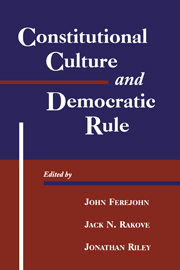Book contents
- Frontmatter
- Contents
- List of Contributors
- Editors' Introduction
- PART ONE CONSTITUTIONAL BEGINNINGS AND TRANSITIONS
- 1 Constitutional Problematics, circa 1787
- 2 Inventing Constitutional Traditions: The Poverty of Fatalism
- 3 The Birth Logic of a Democratic Constitution
- PART TWO CONSTITUTIONAL STRUCTURE AND DESIGN
- PART THREE CONSTITUTIONAL CHANGE AND STABILITY
- Name Index
- Subject Index
2 - Inventing Constitutional Traditions: The Poverty of Fatalism
Published online by Cambridge University Press: 20 March 2010
- Frontmatter
- Contents
- List of Contributors
- Editors' Introduction
- PART ONE CONSTITUTIONAL BEGINNINGS AND TRANSITIONS
- 1 Constitutional Problematics, circa 1787
- 2 Inventing Constitutional Traditions: The Poverty of Fatalism
- 3 The Birth Logic of a Democratic Constitution
- PART TWO CONSTITUTIONAL STRUCTURE AND DESIGN
- PART THREE CONSTITUTIONAL CHANGE AND STABILITY
- Name Index
- Subject Index
Summary
In his reflections on the nineteenth-century British Constitution, Walter Bagehot remarks: “It is often said that men are ruled by their imaginations; but it would be truer to say that they are governed by the weakness of their imaginations” ([1867] 1963, 82). In this chapter I take the politics of post-Communist Eastern Europe as a point of departure from which to explore Bagehot's suspicion. More specifically, I hope to show that, contrary to what Bagehot insinuates, popular political imagination is not so much constrained by inherent deficiencies as it is differentially sustained by political possibilities that occupy the intersection of symbol and strategy.
What I offer is an exploration of political possibility occasioned by historical events, rather than a detailed report on those events. I am especially concerned to examine the rapidity with which assessments of Eastern European politics shifted, in the aftermath of the revolutionary events of 1989, from a sense of enlarged, perhaps limitless, possibility to more or less rampant fatalism. The primary focus for my argument is the impact of such fatalism on assessments of the prospect of establishing enduring constitutional democracy in post-Communist Eastern Europe. I thus am more concerned with the politics of constitution making than with the substantive features of the resulting constitutions. However, compared with those who view the politics of constitution making primarily in terms of the fairly narrow compass of bargaining over institutional arrangements and legal provisions, I focus on what is an analytically separate and, for political purposes, arguably prior question.
- Type
- Chapter
- Information
- Constitutional Culture and Democratic Rule , pp. 71 - 109Publisher: Cambridge University PressPrint publication year: 2001
- 3
- Cited by



